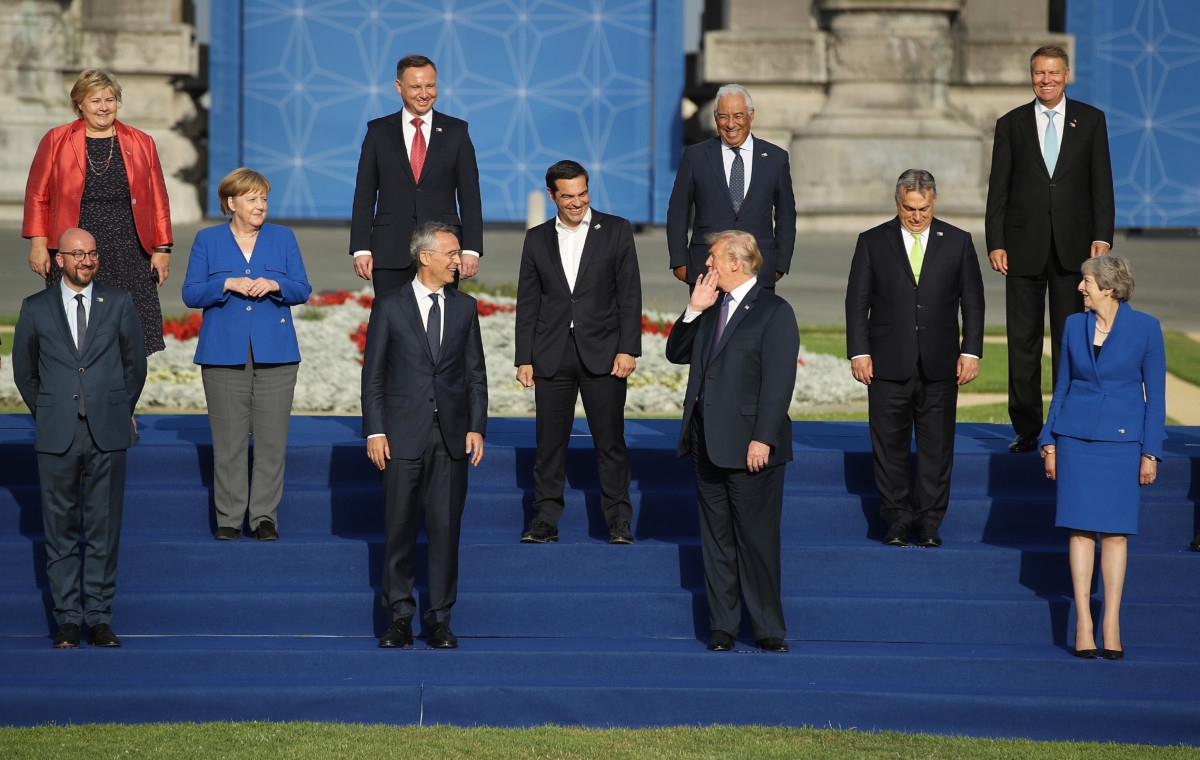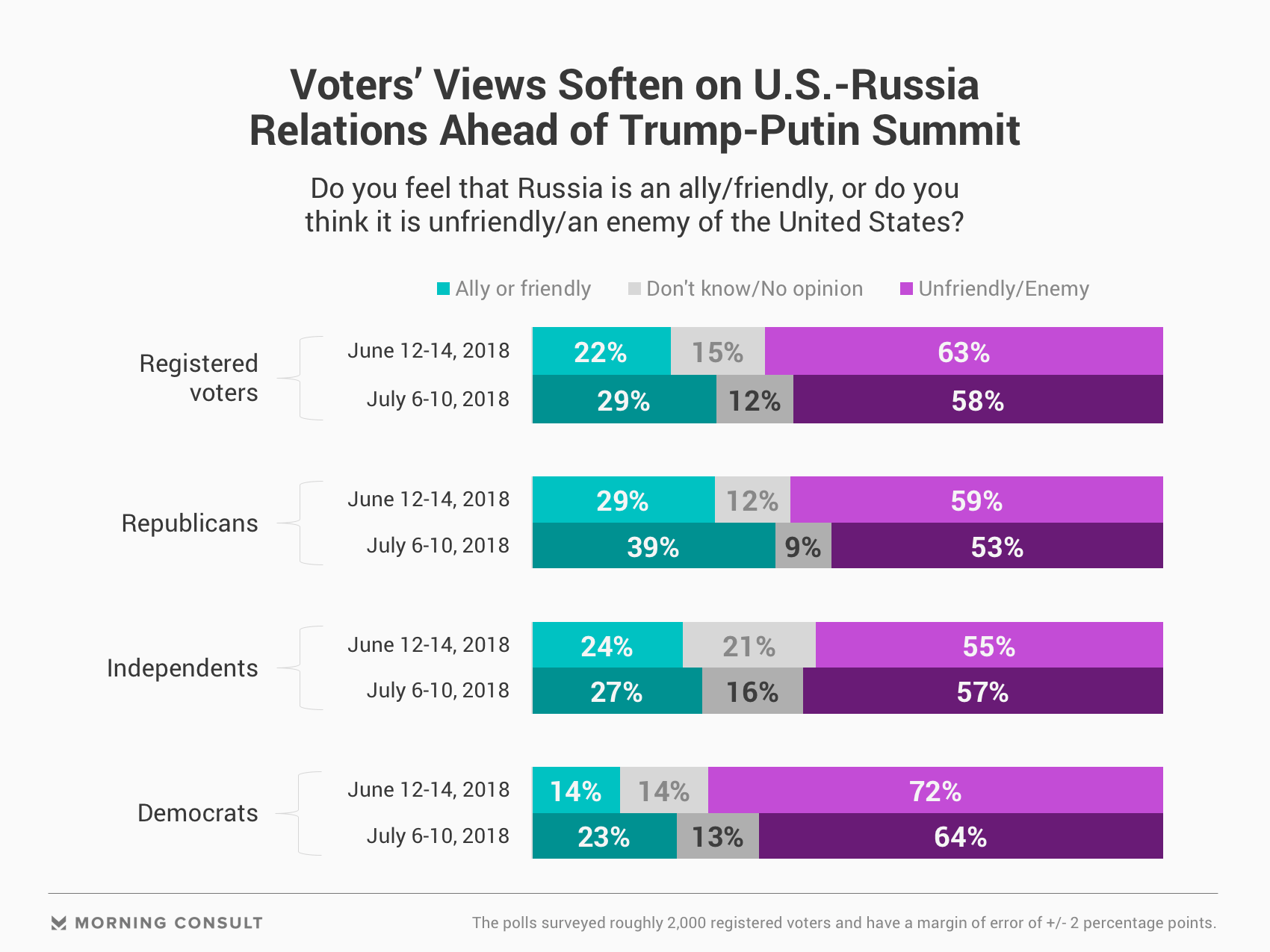Voters from Both Parties Warm Toward Russia Ahead of Trump-Putin Summit

Key Takeaways
23% of Democrats, 39% of Republicans view Russia as friendly or ally, the highest for each party since July 2017.
58% of voters describe Russia as enemy or unfriendly, lowest share this year.
The share of voters who describe Germany as an ally dropped 7 points to 39%.
Amid preparations for the Monday meeting between President Donald Trump and Russian President Vladimir Putin, voters’ views have warmed toward Russia.
That comes despite Moscow’s alleged meddling in the 2016 presidential election and a slew of other issues the United States and its allies included in a declaration following the North Atlantic Treaty Organization’s Brussels summit.
Positive views of Russia from both Democrats and Republicans are at their highest point in a year, according to a July 6-10 Morning Consult/Politico poll. Though less than a third of registered voters, or 29 percent, think of Russia as an ally or friendly, that’s up 7 percentage points since a survey conducted last month.
Among Republicans and Democrats, views of Russia as an ally or friendly power are at their highest since last July, with 23 percent of Democrats and 39 percent of Republicans saying the country is an ally or friendly, according to the survey of 1,999 registered voters. The poll has a margin of error of plus or minus 2 points.
At the same time, negative views about Russia are at their lowest point in 2018, with 58 percent of voters describing Russia as either an enemy or unfriendly. Among partisans, 64 percent of Democrats have a negative view of Russia, compared to 53 percent of Republicans.
The NATO heads of state issued a declaration this week reprimanding Russia for its “illegal and illegitimate annexation of Crimea” and “provocative military activities” and the “ongoing destabilisation of eastern Ukraine.”
But Trump has resisted opportunities to criticize Russia and Putin. Asked in Brussels on Thursday whether he considers Russia a security threat to the United States and Europe, Trump said he did not want it to be, adding that he views Putin as a “competitor.”
“Not a question of friend or enemy. He’s not my enemy,” he said at a news conference. “And hopefully -- someday -- maybe he’ll be a friend. It could happen.”

Those who disagree and view Russia as an enemy has fallen to 25 percent of the voting public, down 4 points since June. Among Republicans, the decline was more dramatic, with 14 percent of GOP voters viewing the country as an enemy, down from 22 percent.
Though Trump has equivocated on his views toward Putin, at the NATO summit this week he didn’t mince words regarding Germany – an American ally and the economic driver of Europe – criticizing the country as a “captive of Russia” due to an oil deal, and saying it was unfair that Germany was not spending more on defense.
Even before Trump’s critical comments, voters’ views on Germany had begun to change. Overall, 73 percent of voters called the country an ally or friendly in the latest poll, the same share as in June. But within that percentage, there was a shift: The share of voters who described Germany as an ally dropped 7 points, to 39 percent, while the share who described Germany as simply “friendly” rose 7 points, to 34 percent.
Eleven percent describe Germany as unfriendly or an enemy – up 2 points since June, though that’s within the poll’s margin of error.
Eli Yokley is Morning Consult’s U.S. politics analyst. Eli joined Morning Consult in 2016 from Roll Call, where he reported on House and Senate campaigns after five years of covering state-level politics in the Show Me State while studying at the University of Missouri in Columbia, including contributions to The New York Times, Politico and The Daily Beast. Follow him on Twitter @eyokley. Interested in connecting with Eli to discuss his analysis or for a media engagement or speaking opportunity? Email [email protected].
Related content

As Yoon Visits White House, Public Opinion Headwinds Are Swirling at Home

The Salience of Abortion Rights, Which Helped Democrats Mightily in 2022, Has Started to Fade
